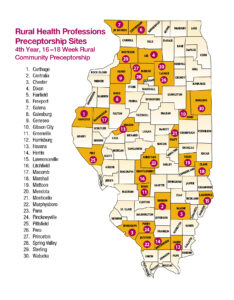 Growing your own is the philosophy of the Rural Medical Education (RMED) and Rural Health Professions (RHP) Programs of the National Center for Rural Health Professions (NCRHP), located on the Health Sciences campus of the University of Illinois – Rockford. The RMED Program recently celebrated 25 years of recruiting and preparing students and graduates for practice in rural communities. Over 70 percent of RMED graduates go into rural practice – making the program one of the most successful rural medical education programs in the United States.
Growing your own is the philosophy of the Rural Medical Education (RMED) and Rural Health Professions (RHP) Programs of the National Center for Rural Health Professions (NCRHP), located on the Health Sciences campus of the University of Illinois – Rockford. The RMED Program recently celebrated 25 years of recruiting and preparing students and graduates for practice in rural communities. Over 70 percent of RMED graduates go into rural practice – making the program one of the most successful rural medical education programs in the United States.
RMED is a response to the fact that most rural Illinois counties are medically underserved. A hallmark of the RMED and NCRHP has been extending an initial focus on rural primary care to include other medical disciplines – general surgery, psychiatry, obstetrics-gynecology and emergency medicine. It also prepares practitioners who understand the importance of inter-professional teams that include physicians, pharmacists, nurses, public health workers, social workers and other practitioners in coordinated efforts to meet both individual and community health care needs.
Students are accepted into the rural track on the Rockford campus after interviews with the Recruitment and Retention (R&R) Committee, consisting of rural physicians, hospital CEOs, public health and social service providers, and a farmer. This is a unique process in the U.S. in having community people from across Illinois interview and select students for entry into the rural programs.
Seven years ago, through the NCRHP, a rural pharmacy program, RPHARM, was started through the NCRHP and, more recently, a rural nursing program, RNURSING, has been initiated. The goal has been to address disparities in access and quality of care in rural communities through a strategy of offering a program targeted on rural health care workforce development. Related to this, rural workforce development contributes to rural economic development, quality of life, and the well-being of rural residents and their communities.
The NCRHP rural programs are based on community-academic partnerships and are responsive to local workforce and rural community health needs. The RMED and Rural Health Professions Programs are also unique for two reasons. First, students from multiple health professions learn together over their four years of education. Secondly, students live in a rural community for four months in their senior year of health professions school, practicing in clinical and hospital settings while conducting a community-oriented primary care (COPC) project linking community health issues with health professions practice. The NCRHP has Memorandums of Understanding with 30 collaborating rural hospitals serving as teaching sites for the Center’s rural programs (see map). After 25 years, there are nearly 300 RMED graduates dedicated to meeting the health care needs of rural communities across the state of Illinois.
The NCRHP has also expanded in perspective to include “pipeline” initiatives such as camps, summer interdisciplinary preceptorships and rural health experiences – all conducted in different rural communities of Illinois to encourage both awareness of and support in seeking rural health careers. The NCRHP is the program office for the federally-funded Illinois Area Health Education Centers Network Program (AHEC) which have set up tracks for young people interested in pursuing rural medical and health care practice. Programs through the IL AHEC Network include but are not limited to: rural health careers camps, job shadowing opportunities for students, and summer immersion experiences in rural communities throughout the state.
Finally, the NCRHP is one of only three World Health Organization Collaborating Centers on health workforce sustainability in North America, with the goal of translating RMED, inter-professional, and the grow your own philosophy to other countries worldwide.
For more information on the NCRHP and its rural programs, including the IL AHEC Network go to www.ncrhp.uic.edu. If you identify academically-inclined students in your rural communities that show an interest in rural health professions, please encourage them to visit the website and contact them for more information. This subtle mentorship can often help direct young people to an exciting, rewarding career that will also improve local health care.
The faculty and staff of the NCRHP look forward to collaborating with other organizations across the state, nationally, and internationally in pursuing the goal of Healthy People, Healthy Rural Communities.









